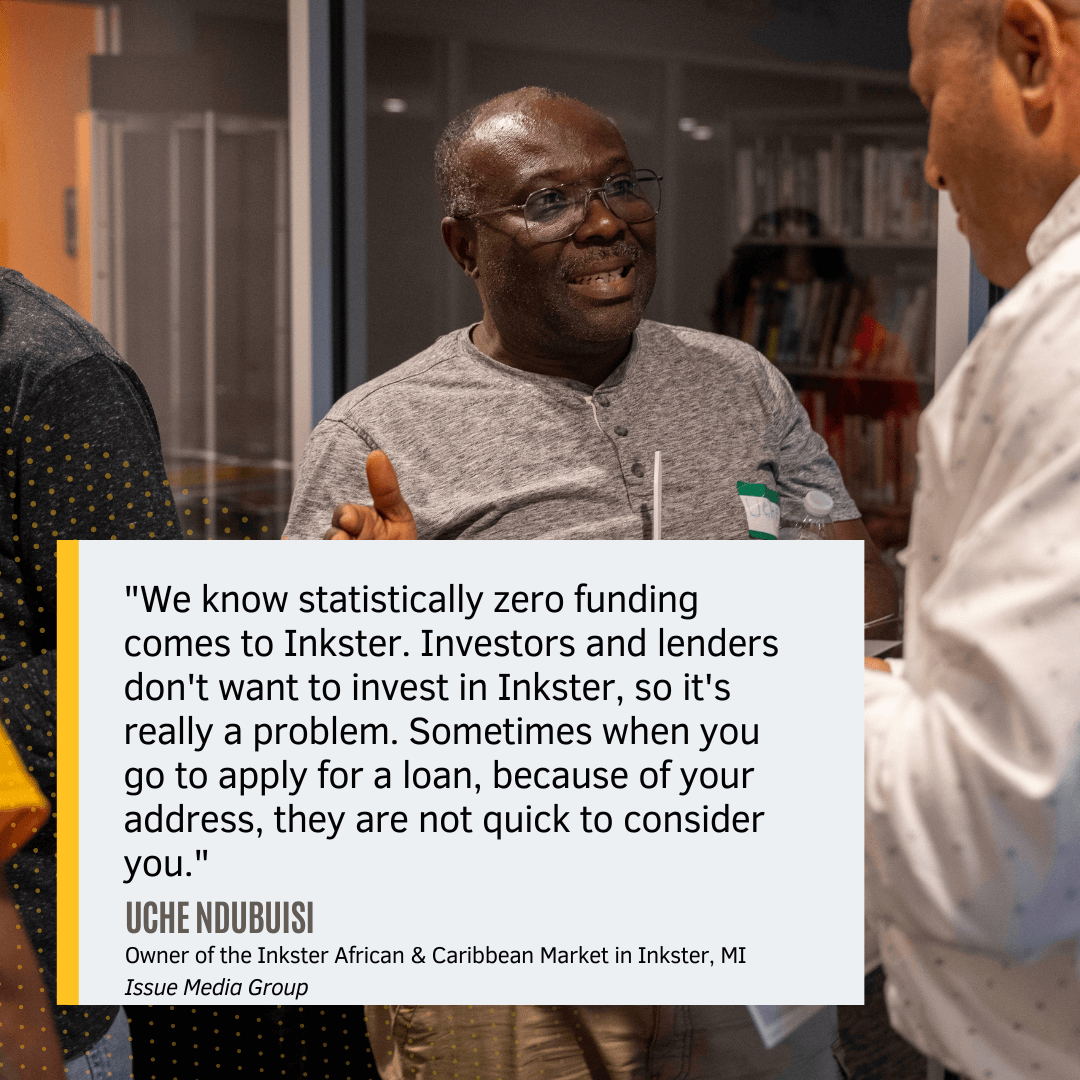Data And Impact
NEI 2023 Biennial Survey: Elevate Your Voice
Over 1,000 business owners in Southeast Michigan responded to the New Economy Initiative’s 2023 Biennial Survey, and the theme is “Elevate Your Voice.” These survey results will be compiled into a report forthcoming in spring 2024 that will be used to inform future resources and support that will help businesses grow.
We want to send a huge thank you to the metro Detroit small business ecosystem and all the ambassadors who worked to encourage over 1,000 business owners to respond to the survey. Here is a complete list of the 2023 biennial survey ambassadors.
Through the survey, NEI was able to collect information about the challenges, sentiments, and goals of business owners in southeast Michigan. These findings provide valuable insights into the current state of small businesses in the region, including the progress that the metro Detroit ecosystem has made and the gaps that are still present.
In addition to the survey, NEI also held listening sessions in partnership with Issue Media Group, where we were able to collect qualitative data and hear about the entrepreneurship experiences from business owners in outer Wayne County communities. Throughout the report, there are quotes from business owners corresponding with the quantitative data that was collected through the survey.
Here are some of the questions that the dataset will dive into:
Goals
How important are the following business goals to you for the next 1-2 years (Respondents were given the following options to rank):
- Develop new products or services
- Hire additional employees
- New technology, processes, or systems
- Brick-and-mortar space
- New contract opportunities
- New customers and increase foot traffic
- Access to capital
Challenges
Over the past two years, how challenging have these areas been for your business (Respondents were given the following options to rank):
- Hiring and retaining qualified employees
- The cost of paying employees
- Procuring needed materials
- Accessing capital
- Complying with the regulatory environment
- Infrastructure
Sentiments
- How confident do you feel in your skills for owning a small business?
- How do you feel about the business environment right now?
- From a financial perspective, how do you feel right now about the future of your business?
Resources
How confident are you that you can find the resources in the following areas (Respondents were given the following options to rank):
- Finance
- Marketing
- Human Resources
- Technology and Operations
- Legal
- Real Estate
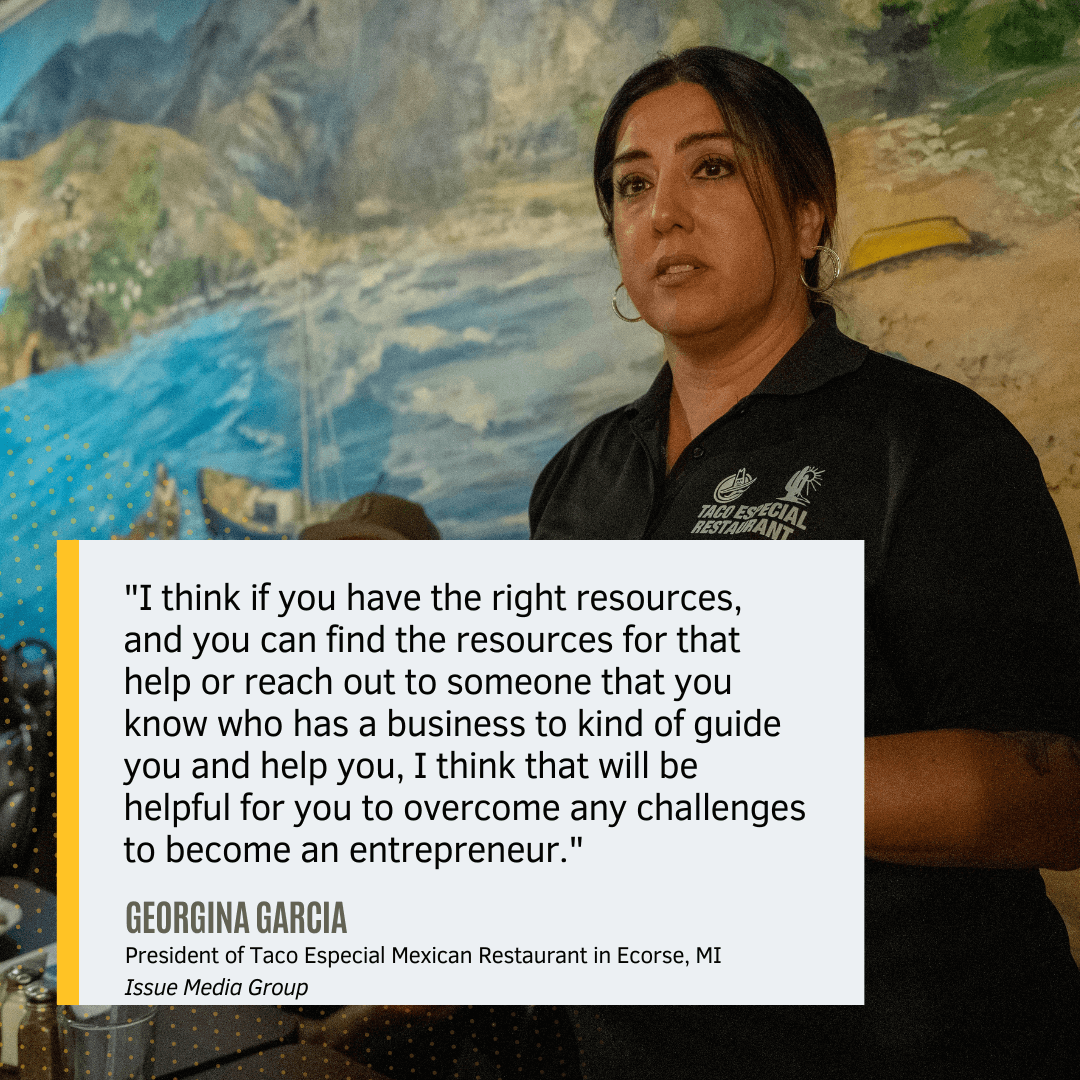
The New Economy Initiative will continue to release data in phases on social media and on our website. Stay tuned for a deeper analysis of the results, along with the official report.
Listening Sessions:
In an effort to gain qualitative data, NEI and Issue Media Group partnered to further the Elevate Your Voice project by hosting listening sessions in three communities: River Rouge/Ecorse, Dearborn, and Inkster. Each two-hour session included 20 to 30 small business owners. These insights will help inform future approaches to supporting entrepreneurs, elevate the voice of each community’s small business ecosystem, and engage critical partners.
Key Findings from the Issue Media Group Report:
- LaWanda Hines, co-owner of Now and Forever Flower Boutique, in River Rouge, MI: “Capital is big. We all need funding. Unfortunately, it is not easy to get those things without having to sacrifice something else or to put yourself in this long binding contract of sorts. I would also say people. It’s a challenge. And I would say my biggest thing is time. Unfortunately, no one can give me that but God, so it always feels like running out of time because at least for us, with our business, we do a lot of our own in-house things. So social media and emails and advertisements are all in-house, aka me.”
- Que Shebley, founder of Shebley Group, LLC, the parent company of the Que Shebley brand, in Dearborn, MI: “Of course, COVID was a hit for us, trying to keep the business sustained with things like operational costs. The positive side of it was there was more online exposure. Funding would be the biggest challenge. And then, trying to find local resources. Before it was a lot more challenging, in comparison to now, to find resources needed to support a small business, like funding. In terms of starting it, it was challenging just finding the information online for many of the basic things that are needed for a small business, including registration and creating an Ein number. I did not have experience in those resources, so I had to do a lot of research and self-learning.”
- Ruth Williams of family-owned and operated business Harrison Liquor, in Inkster, MI: “If you don’t know the ordinances, and the zoning areas and things like that, the city is really hard on you in trying to get your permit or your business license. So, that’s the biggest problem because trying to start a business in Inkster is very, very hard. It’s gotten a lot better from where it was, maybe, five years ago. But that’s the biggest challenge for a business owner trying to start a business here.”
- Sarah Elmoussawi, owner of Loujain Accessories, based in Dearborn, Michigan: “Access to capital like loans with lower interest rates, more publicity, and more events that support small businesses. That’s what they need. That’s what I hear all the time. Especially with the economy right now. Just today, someone was asking me, “What’s next, what we should do? We’re not getting sales.” If there are more events or markets or capital, this is what they need so they can support themselves.”
Sharing Stories:
To inform the ecosystem, Issue Media Group created 12 profile stories from participating business owners and published them in their local publications, Model D and Metromode.
Learn more from the business owners:
- Jason Dixon, founder of Strategic Alliance Community Development in Inkster, MI
- Dion Chapmon, owner of A Cut Above the Rest Barbershop in River Rouge, MI
- Nada Hassan, owner of Paint with Nada in Dearborn, MI
- Doudou Kane, of family-owned and operated business KG’s African-American Grill in Inkster, MI
- Georgina Garcia, president of Taco Especial Mexican Restaurant in Ecorse, MI
- Que Shebley, founder of Shebley Group, LLC, the parent company of the Que Shebley brand, in Dearborn, MI
- Uche Ndubuisi, owner of the Inkster African & Caribbean Market in Inkster, MI
- LaWanda Hines, co-owner of Now and Forever Flower Boutique in River Rouge, MI
- Shadia Amen, founder and CEO of Shadia Amen Photography in Dearborn, MI
- Sarah Elmoussawi, owner of Loujain Accessories in Dearborn, MI
- Ruth Williams, of family-owned and operated business Harrison Liquor in Inkster, MI
- Gina Wilson Steward, owner and publisher of The Telegram in Ecorse, MI
GOALS
The second phase of the survey dives into what business owners need to achieve their growth goals, including the decision to open brick-and-mortar locations, access to capital, customer acquisition, procurement opportunities, technology adoption, and staffing. These responses will help us identify where our focused efforts can make the most significant impact in aiding business owners to reach their objectives.
Survey Results
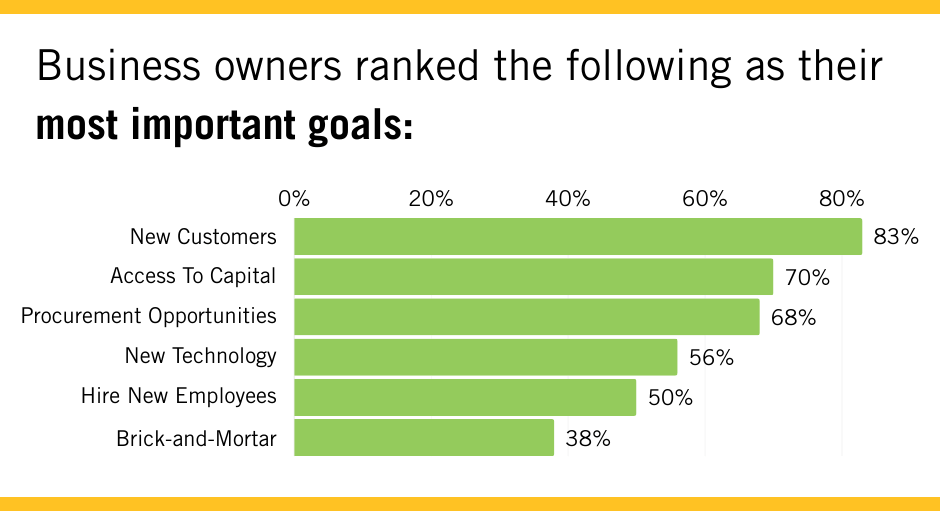
New customers
Over 83% of business owners found it very important to attract new customers and ranked it as their highest goal.
- Unlike other items, we see little difference between business size as both large and small businesses rank new customers as a top pathway to reach their goals.
There is a notable difference by industry when looking at the importance of new customers.
- Over 90% of retail and restaurant businesses ranked new customers as very important compared to about 67% of construction businesses.
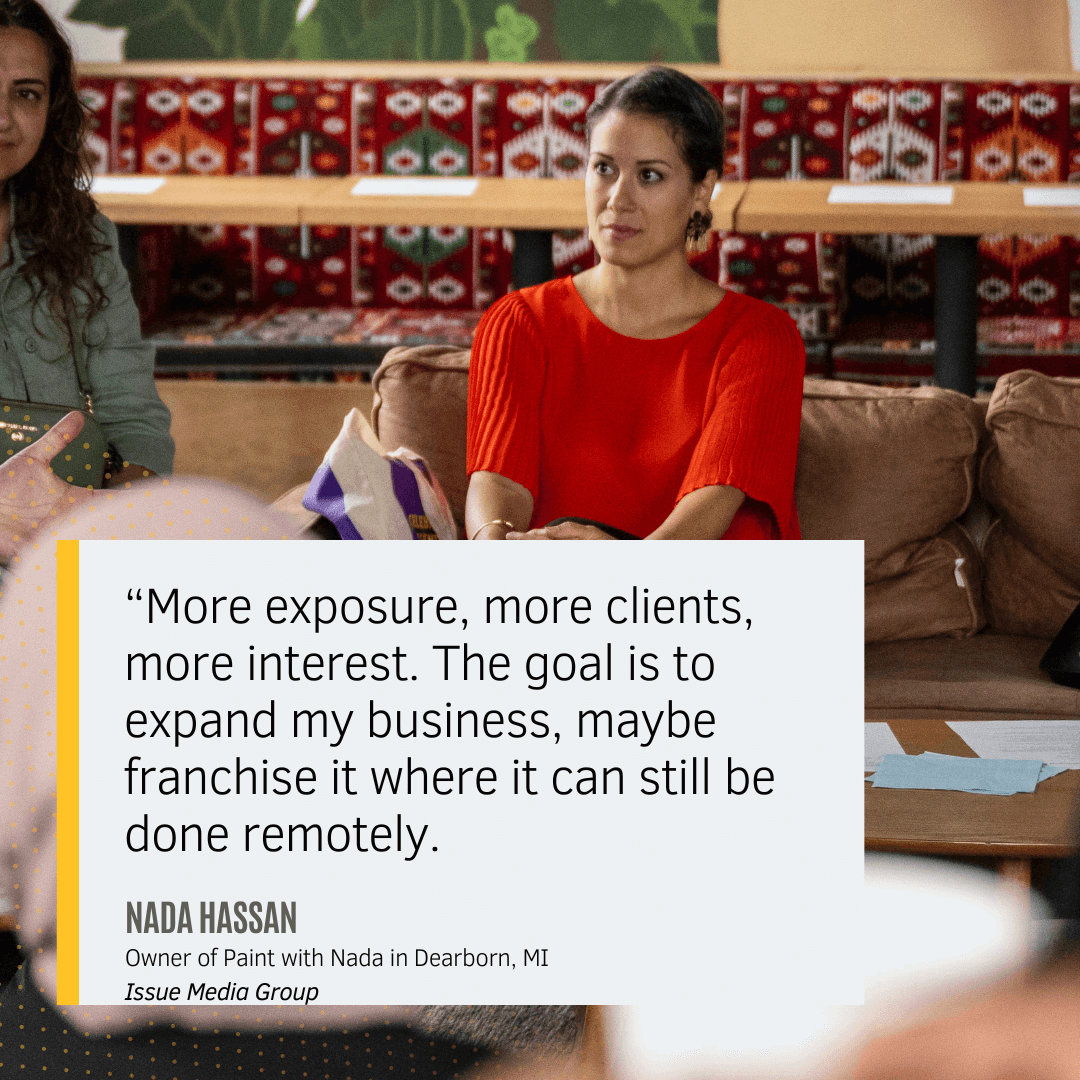
Access to Capital
Gaining access to capital was ranked the second highest need in order to meet goals with 70% of respondents ranking it as very important.
There was a variance in responses among different demographic segments, with the largest variances being in the following segments:
- Access to capital was more important to smaller businesses than larger ones: Smaller businesses that generate less than $50,000 in revenue were nearly three times more likely to rank access to capital as very important than larger businesses that generate over $1 million in revenue. In the survey, 27% of larger businesses ranked access to capital as very important.
- More Black business owners need access to capital: Business owners who identify as Black were two times more likely to rank access to capital as very important at 79.6% where business owners who self-identify as white ranked it at 39.7%.
- Connection between household income and access to capital: There is a strong correlation between the household income of business owners and the importance of access to capital. Access to capital was very important for 78.3% of surveyed business owners who have a household income of less than $20,000. In contrast, only 47.5% of business owners with over $250,000 in household income ranked access to capital as very high.
- Needs are higher except in Washtenaw County: There was a large variance between how businesses in Washtenaw County ranked the need of access to capital compared to other southeast Michigan counties.
- Washtenaw County: 45.5%
- Wayne County: 73.4%
- Oakland County: 67.3%
- Macomb County: 64%
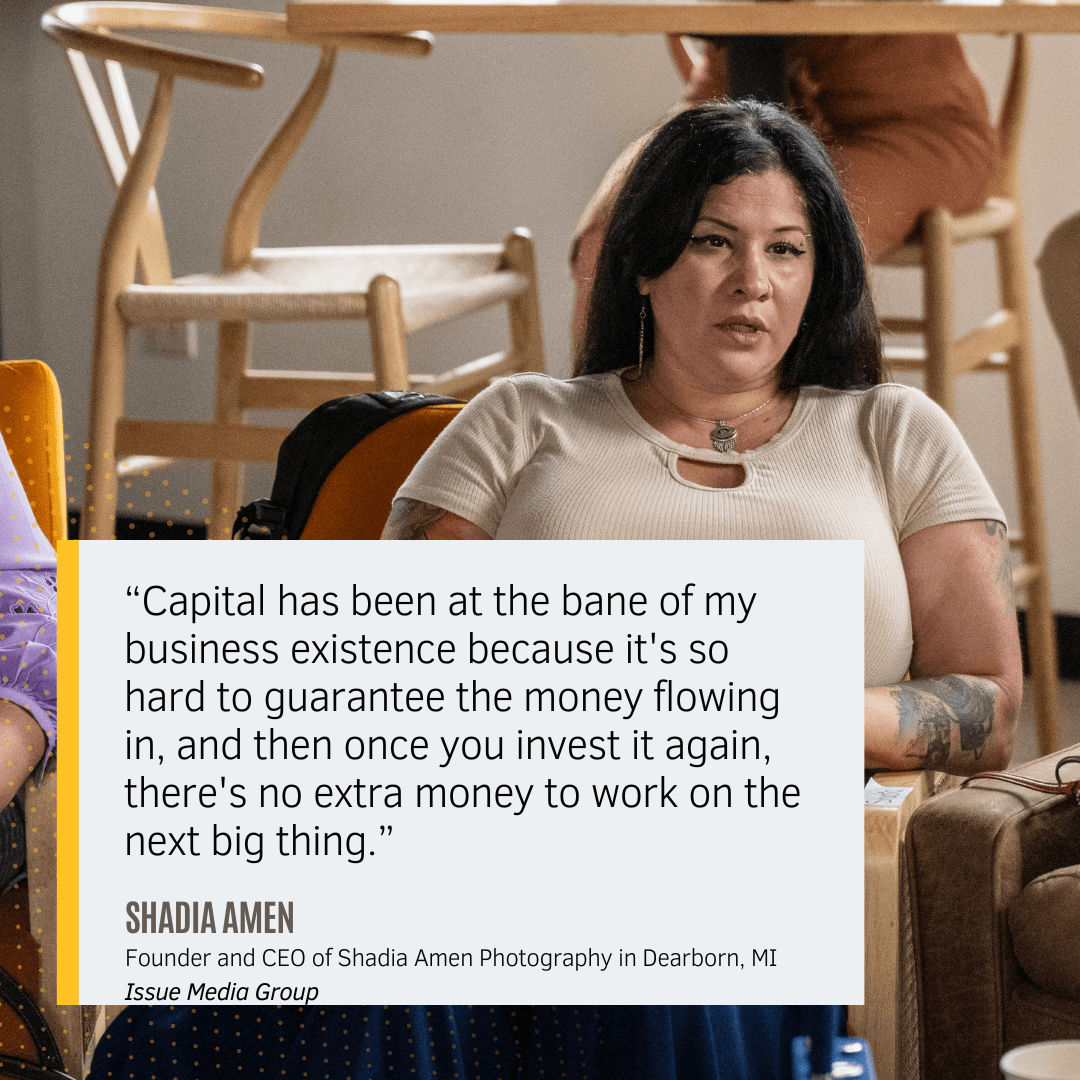
New Contracts and Procurement Opportunities
Obtaining new contracts and procurement opportunities was ranked as the third most important goal at 68%.
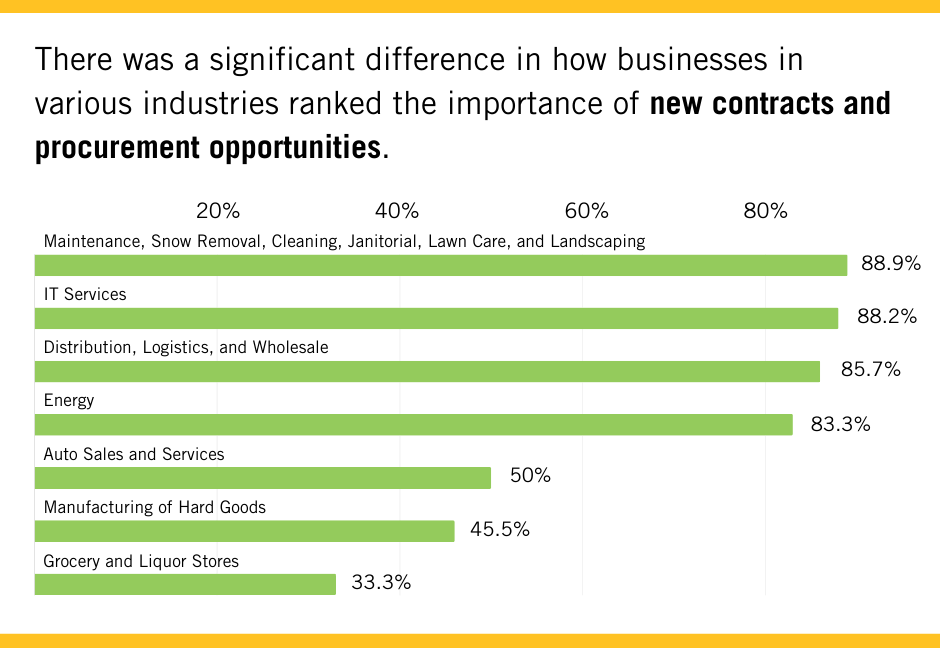
When looking at the demographics, the survey results showed that there is a higher need for different racial groups and within specific geographies.
- New contracts needed for Indigenous, Asian, and Black entrepreneurs: About 80% of Indigenous, Asian, and Black respondents ranked contracts as very important, while about 60% of Middle Eastern, Latinx, and White respondents ranked new contracts as very important.
- More opportunities needed in the tri-county region: There was a noticeable variance between how businesses ranked access to new contracts and procurement opportunities, with 51.5% of Washtenaw County respondents ranking it as very high compared to other Southeast Michigan counties.
- Wayne County: 69.4%
- Oakland County: 68.4%
- Macomb County: 66.0%
New Technology
Implementing new technology was ranked as the fourth most important goal at 56%.
- New technology was most important to Black business owners at 63% and Asian business owners at 60%. It was least important to White business owners at 32.2% and Middle Eastern business owners at 44.7%.
Hire New Employees
Hiring new employees was ranked as the fifth most important goal at approximately 50%.
Brick-and-Mortar
Less than 38% of the surveyed business owners ranked opening a new brick-and-mortar location as their goal, making it the least important goal.
- There is a clear correlation between household income and how important a brick-and-mortar is. Lower income households are almost two times more likely to deem a brick-and-mortar as ‘very important’.
More results coming soon!
Data Archive
In 2016, the New Economy Initiative commissioned PricewaterhouseCoopers LLP and the W.E. Upjohn Institute for Employment Research to measure the economic and employment impact of its $96.2 million in grants since 2007. NEI then created a document to tell the stories behind that impact. Each of those reports can be downloaded below:
- Impact Report of the New Economy Initiative, Vol. 1, 2016 – Prepared by the New Economy Initiative, September 2016
- The Economic Impacts of the New Economy Initiative in Southeast Michigan – Prepared for the New Economy Initiative by PricewaterhouseCoopers LLP, May 2016
- The Employment Impact of the New Economy Initiative (NEI) on the Detroit Region and the State of Michigan – Prepared for the New Economy Initiative by the W.E. Upjohn Institute for Employment Research, July 8, 2016
In addition to economic and employment impact reports, NEI also commissioned a survey of entrepreneurs in southeast Michigan’s attitudes regarding the resources available to them in the region.
- Entrepreneur Survey Results and Analysis – Prepared for the New Economy Initiative by Data Driven Detroit and JFM Consulting, July 26, 2016.

